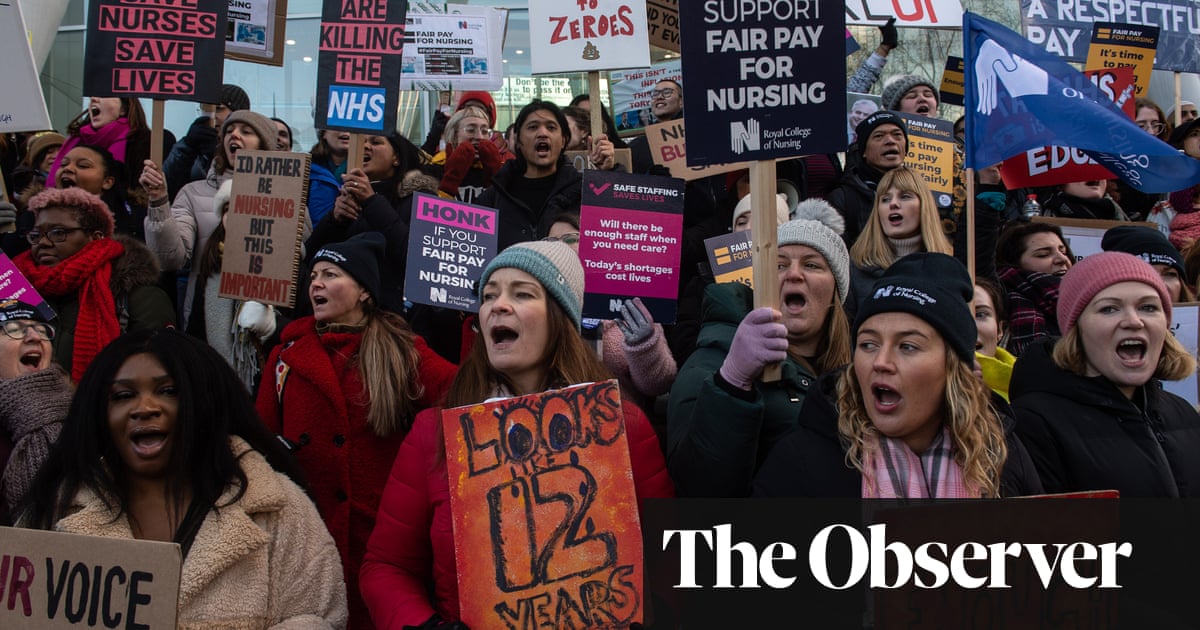
Nursing shortages are allowing “profiteering” staffing agencies to triple their rates, care leaders have warned, raising the risk of vulnerable patients being forced to move care homes and increasing the burden on the NHS.
The crisis is forcing some nursing homes to become standard residential care homes without support for people with chronic diseases.
The shortage also makes it harder for NHS hospitals to discharge patients. Some hospitals have redeployed their own staff into nursing homes to free beds in hospitals. In other places, NHS trusts are competing for staff with care providers.
Geoff Butcher, director of Blackadder Corporation, which runs six homes in the West Midlands, said that he paid nurses about £19.50 an hour, slightly higher than the NHS rate of £16.52. “Two of our nurses resigned recently and they’ve gone to an agency for £35 an hour,” he said. “And that agency then came to us and said we can have these staff back at £52 an hour. They want £95 an hour for those nurses on a bank holiday nightshift. It’s utterly unaffordable.
“Because the NHS can’t recruit they are having to use these agencies as well. So the NHS is bidding against us, therefore they’re pushing the rates up, and the whole thing has gone into a completely crazy spiral. The agencies are just grossly profiteering out of it.
“Sometimes I’m finding out half an hour before the shift starts that people aren’t available. But when we see those agency workers again and ask what happened, they say ‘Oh we had to go to work for Wye Valley trust or Worcester general’. So we’ve been gazumped by the NHS or another operator.
“We’re having to ask existing staff to do more shifts and backfilling with agency staff. We’re trying to find a way of recruiting people from overseas but that takes weeks rather than days.”
In its annual report last month, the Care Quality Commission highlighted the case of “an established nursing home” that had deregistered because it could not find enough nurses, forcing 15 vulnerable residents to find a new home. The report said: “They said that there was such a shortage of nurses (and the fees were in the thousands every week for agency nurse cover) that it was untenable to continue providing nursing care.”
Nadra Ahmed, chair of the National Care Association, said: “I think agencies have taken the opportunity to inflate their prices. It’s the effect of market forces, and that is really worrying. It’s profiteering. The government needs to step inin and moderate what’s happened.
“You have an exhausted workforce, having come through Covid, when they were pretty much left on their own, and they have the option not to do it any more. They can choose not to work on Saturdays, or on nights. Agencies are aggressively recruiting and making money out of this, but you can see that some people do want a work-life balance.”
She said the sector had always tried to recruit locally, but needed workers from overseas, adding: “That route is now closed and we’re not getting people coming through. Care workers are not on the shortage occupation list.”
Vacancies in residential care have risen from 6% in April to 10.2% in September, and nursing vacancies are at 13.4%. Skills for Care data shows that 410,000 people left care jobs in the last 12 months.
Care providers say they are unable to raise wages to compete with retailers such as Amazon because funding for many people in social care comes from government. Average weekly fees for nursing care paid by local authorities are £764 per person – much lower than the £1,075 required to generate a sustainable return, according to analysts LaingBuisson.
NHS England began capping agency staff costs in 2016 by using approved “framework” agencies and running recruitment through a central body, NHS Professionals, although during the pandemic costs rose substantially. Eddy McDowall, chief executive of the Oxfordshire Association of Care Providers, said a similar system could be brought in by the Department of Health and Social Care.
“A hidden issue has been nurses being poached by the NHS, either with subtle encouragement or overt recruitment,” he said. “An increasing number of care homes have been reporting care staff at all levels simply resigning and walking across to acute hospitals who were hiring.”
A total of 45,328 staff working in older adult care homes had not had a second vaccination by 7 November, according to NHS figures. New rules on mandatory vaccinations for staff in care homes came into force last week, although workers have until Christmas to supply evidence that they are exempt from the requirement.
More than 72,000 carers working in people’s homes or with younger adults have not yet had any Covid vaccination. They, along with NHS workers, will also be required to be fully vaccinated by April next year.
The health department said: “We are working to ensure we have the right number of health and social care staff with the skills to deliver high-quality care to meet increasing demands. Care homes and home care providers will benefit from a new £162.5m workforce retention and recruitment fund to bolster the dedicated care workforce.
“We also recently launched our made with care recruitment campaign to encourage people into a career in care. This follows the announcement of £5.4 bn of additional funding to reform social care over the next three years, including £500m to support training and career development for the workforce.”












